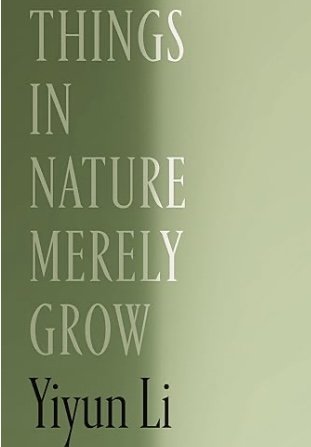Things In Nature Merely Grow by Yiyun Li (Farrar, Straus and Giroux) ~Janet Brown
When Yiyun Li’s first son committed suicide while he was still in high school, Li didn’t have the luxury of succumbing to her feelings. Her youngest son needed her strength. Six years later he killed himself.
Immediately Li “began to feel that sensation for which there is no name.” Her life became an abyss. This state of being was a concrete fact, against which her feelings were useless. Trained in science before she became a novelist who wrote eleven books that preceded this one, among them The Vagrants (Asia by the Book, March 2009) and A Thousand Years of Good Prayers (Asia by the Book, April 2020), Li turned to facts, “the harshest and hardest part of life.”
Facts bring “order and logic,” while feelings encourage “the inexplicable and the illogical”where “words take on a flabbiness and staleness.” “I have only this abyss, which is my life,” a state that is permanent. It can slip into Greek tragedy or it can find a different form of existence, one that is stripped of narrative.
Li chooses Radical Acceptance, living with unchangeable facts without bringing judgement to them, recognizing distress without excessive feelings but with keen attention.
The death of her children is a fact. Suppositions, intuitions, and searches for reasons why offer nothing that will change this. Instead Li follows a path that she was taught by Marsha Linehan, author of Building a Life Worth Living and the creator of dialectical behavior therapy with its tools of acceptance, mindfulness and shaping. “Do things that work,” is a tenet of Linehan’s and Li adapts this to “Do things that make sense to me.”
How to survive in the dark hole of an abyss with its threat of timelessness is to “mark time..by doing anything that keeps the body moving and the mind focused.” Marking time is done only by those who are “in the realm of the living,” and provides a structure for a life.
Cooking and gardening are activities that require the discipline of “order and logic” and “keen attention” upon facts. Writing draws upon a practice in which “everything is relevant and noticed” and facts are never ignored.
Li learned as an abused child to “keep my body still and my mind clear.” Born in Beijing near the close of the Cultural Revolution, with a mother who was badly scarred by modern Chinese history, Li had an aversion to emotional indulgence from her earliest years. As a student of science, she abhors sloppiness of thought. “Cliches,” she believes, “corrode the mind” and “any adjective is an irrelevance.” She repudiates the Western idea of grief with its progression toward an end point and is equally dismissive of the criticism that comes from readers in China, who revile her for using the words “death” and “die” instead of softened euphemisms.
Refusing to evade or soften facts and unflinchingly observing emotions while letting them pass seem to echo the Chinese practice of “eating bitterness.” Certainly Marsha Linehan was deeply influenced by Buddhist thought, which she has freely acknowledged. Li, who was hospitalized for mental illness when she was younger, lives with the knowledge that “reality and unreality remain permeable.” To remain within the borders of reality, her sense of time is focused upon “now and now and now.” The verb ‘to be” is “undyable” and her sons are now and forever her children.
“Things in nature merely grow, until it’s time for them to die,” she says, “There is no shared abyss. We each dwell in our own.” Although nobody can be with Yiyun Li within hers, she has reached out from it to give signposts for how this state can be survived.
